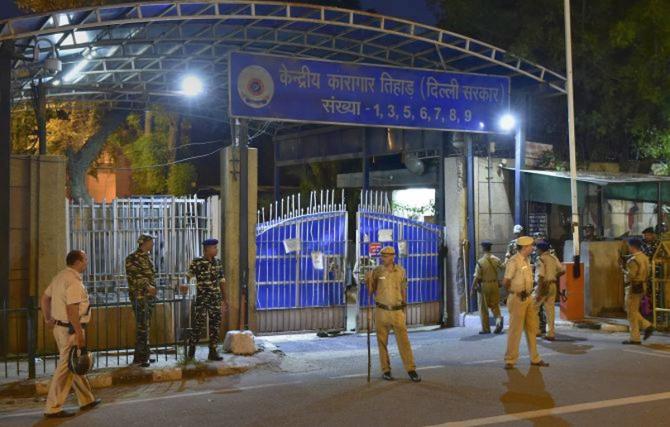Taking note of the "unprecedented surge" in COVID-19 cases, the Supreme Court on Saturday moved to decongest prisons and ordered the immediate release of prisoners who were granted bail or parole last year.

Observing that the decongestion of prisons housing around 4 lakh inmates across the country is a matter concerning "health and right to life of" prisoners and police personnel, a bench headed by Chief Justice N V Ramana said all those who were allowed to go out on bail in March last year by the high-powered committees of states and Union Territories be granted the same relief without any reconsideration to avoid delay.
"Further we direct that, those inmates who were granted parole, pursuant to our earlier orders, should be again granted parole for a period of 90 days in order to tide over the pandemic," the bench, also having Justices L Nageswara Rao and Surya Kant, said in its order uploaded on the apex court's website on Saturday.
There is a serious concern about the spread of COVID-19 in "overcrowded prisons where there is lack of proper sanitation, hygiene and medical facilities”, the bench said, adding “there is a requirement for effective management of pandemic from within the prison walls so as to defeat this deadly virus.”
The top court took note of its March 23, 2020, order by which it had directed all states and UTs to constitute high-powered committee to consider releasing on parole or interim bail prisoners and the under trials for offences entailing up to 7-year jail term to decongest prisons in the wake of coronavirus pandemic.
It had also directed states that the HPC shall consist of (i) Chairman of the State Legal Services Committee, (ii) the Principal Secretary (Home/Prison) by whatever designation is known as, (ii) Director General of Prison(s), to determine which class of prisoners can be released on parole or an interim bail for such period as may be thought appropriate.
CJI Ramana, writing the order for the bench, said, "The rapid proliferation of the virus amongst the inmates of congested prisons is a matter of serious concern.
“The HPCs...shall consider release of prisoners by adopting the guidelines (such as inter alia, SOP laid down by NALSA) followed by them last year, at the earliest. Such of those States which have not constituted High Powered Committees last year are directed to do so immediately. Commissioner of Police Delhi shall also be a member of the High Powered Committee, Delhi,” the order said.
Referring to immediate concern of raging pandemic, the bench highlighted the importance of prisons' decongestion and said “HPCs, in addition to considering fresh release, should forthwith release all the inmates who had been released earlier pursuant to our order March 23, 2020, by imposing appropriate conditions. Such an exercise is mandated in order to save valuable time.”
Referring to a judgement, the top court said as a measure and being the “sentinel on the qui vive of the fundamental rights” there was a need to strictly “control and limit the authorities” from arresting accused in contravention of guidelines laid down by this court in the Arnesh Kumar judgement.
“All the State Governments instruct its police officers not to automatically arrest when a case under Section 498A IPC (Dowry harassment) is registered but to satisfy themselves about the necessity for arrest under the parameters laid down above flowing from Section 41 CrPC," the judgment had said.
The apex court said the direction prohibiting automatic arrest will not be restricted to dowry harassment cases only would be applicable to “cases where offence is punishable with imprisonment for a term which may be less than seven years or which may extend to seven years, whether with or without fine”.
The fight against pandemic is “greatly benefitted” by transparent administration, it said and took note of the example of Delhi, where the prison occupancy is updated in websites.
“Such measures are required to be considered by other States and should be adopted as good practice. Moreover, all the decisions of HPCs need to be published on respective State Legal Service Authorities/State Governments/High Courts websites in order to enable effective dissemination of information.
It said overcrowding of prisons is a problem plaguing several countries including India and directed the jail authorities to provide proper medical care to those who do not want to come out of prisons.
“The authorities are directed to ensure that proper medical facilities are provided to all prisoners who are imprisoned. The spread of Covid19 virus should be controlled in the prisons by regular testing being done of the prisoners but also the jail staff and immediate treatment should be made available to the inmates and the staff,” it said.
It is necessary to maintain levels of daily hygiene and sanitation required to be improved and suitable precautions shall be taken to prevent the transmission of the deadly virus amongst inmates, it said.
On Friday, the bench had termed the situation "very alarming” and had said that it would pass orders to ensure release of prisoners to decongest prisons in view of a surge in COVID-19 cases in the country.
On March 16, 2020, the top court had taken suo motu cognisance of overcrowding of prisons across the country and said it is difficult for jail inmates to maintain social distancing to prevent the spread of coronavirus.











 © 2025
© 2025